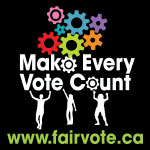December 16, 2015
Fair Vote Canada’s multi-partisan board welcomes a new president and vice-president to help spearhead its push for equal effective votes and proportional representation in the House of Commons.
Gary Shaul, a retired Ontario civil servant and long time, non-partisan campaigner for electoral reform in Ontario, has been acclaimed as president by the FVC national council.
He succeeds Doug Bailie of Edmonton, a leader of the organization since its inception fifteen years ago.
Shaul is teamed with Vice President David Merner, former president of the British Columbia Federal Liberal Association and Liberal candidate in the riding of Esquimalt-Saanich-Sooke in 2015.
Vice President Brenda Oslawsky will continue to focus on the upcoming electoral reform plebiscite being conducted in Prince Edward Island in November 2016.
“We have a fabulous opportunity to fix Canada’s horse-and-buggy voting system and we don’t intend to waste it,” Shaul said. “Three federal political parties are committed to make every vote count, and that adds up to a strong democratic mandate for voting reform. We hope that conservatives and the Conservative Party will also put their best ideas forward in the upcoming consultations to speak for their supporters in Atlantic Canada, Toronto, Vancouver Island and other communities where they have no representation in the House of Commons.”
“We fully support the Trudeau government’s commitment to public consultation followed by enactment of new and democratic voting rules. The next federal election should deliver a House of Commons with fair representation of voters of all political persuasions from every party of the country.”
Merner said the Trudeau government’s commitment to reform the voting system before the next federal election represents a turning point in Canadian history.
“We’ve seen from the past ten years how the ‘First Past the Post’ system fosters adversarial politics and regional divisions,” Merner said. “We know from experience in other countries that more proportional representation leads to greater representation of women, minorities, and others who are under-represented in our current electoral system.”
He said Canadians will now have an opportunity to participate in broad consultations led by an all-party parliamentary committee.
Shaul said the parliamentary committee should be equipped with sufficient staff and budget to meet its own demanding timetable for action. “Reform legislation in 16 months is doable, but requires some very smart management,” he said. Any serious electoral reform is likely to require significant revisions to Canada’s electoral system. “The government must allow Elections Canada enough time to put the new machinery in place for 2019”, Shaul said.
-30-

